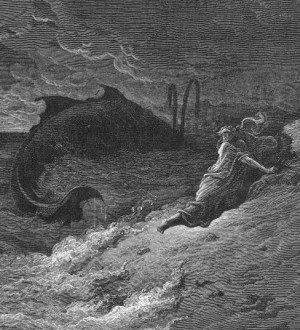 The last stage in the departure phase of the hero’s journey is called the Belly of the Whale, after the Biblical story of Jonah. After receiving the call and passing the threshold to the land of adventure, the hero faces what may quite possibly be the darkest hour of his life and dies in some way to the home he has just left behind.
The last stage in the departure phase of the hero’s journey is called the Belly of the Whale, after the Biblical story of Jonah. After receiving the call and passing the threshold to the land of adventure, the hero faces what may quite possibly be the darkest hour of his life and dies in some way to the home he has just left behind.
I know what you’re thinking: “Huh? Why does the hero die at the beginning of the story? Isn’t that supposed to happen later?” Well…yes, it does, but the symbolic death at this point is important, too. At its core, the hero’s journey is a story of transformation and growth. When the hero comes back from the lands of adventure, he isn’t the same person he was when he first left–he’s been changed in some way. And in order for that change to take place, the hero needs to let go of who he was and move forward.
Joseph Campbell describes it like this:
The idea that the passage of the magical threshold is a transit into a sphere of rebirth is symbolized in the worldwide womb image of the belly of the whale. The hero, instead of conquering or conciliating the power of the threshold, is swallowed into the unknown and would appear to have died. This popular motif gives emphasis to the lesson that the passage of the threshold is a form of self-annihilation. Instead of passing outward, beyond the confines of the visible world, the hero goes inward, to be born again.
Of course, the death and rebirth doesn’t have to be literal (though it can be, as it was with Dionysus). The point is to show that the hero has fully crossed the threshold, cutting all his ties with home and burning his ships on the shores of the land of adventure. Once the hero passes through the belly of the whale, there’s no going back–it’s all or nothing now.
So how common is this trope really? Actually, it occurs more often than you might think. In Harry Potter and the Sorcerer’s Stone, it happens when Harry boards the Hogwarts Express and realizes he’s leaving his old world completely behind. It happens in The Lion, the Witch, and the Wardrobe when Peter and the others decide to go after Mr. Tumnas instead of returning to their own world through the wardrobe. It happens in Star Wars IV when the Millennium Falcon gets sucked into the Death Star, and in Final Fantasy IV when Cecil washes up in Mysidia.
The main theme running through all these examples is that adventures are hard. If they were easy, anyone could go on them–and no one would be changed by them. They may be fun, and they’re definitely worth it, but to set out on one, you always have to give up something close to you–and that’s hard.